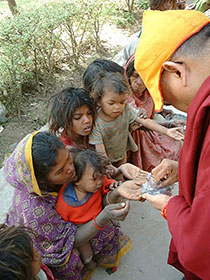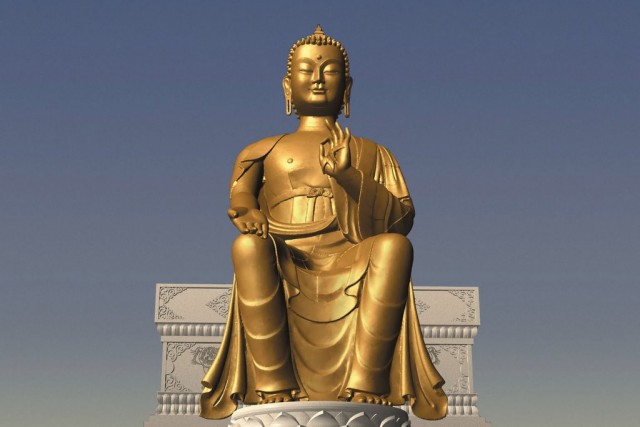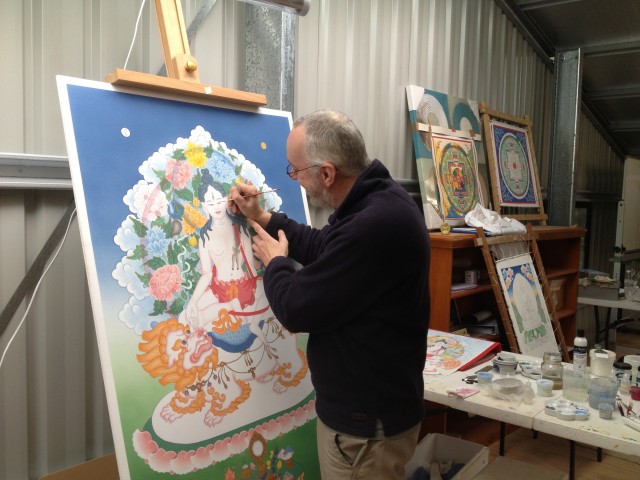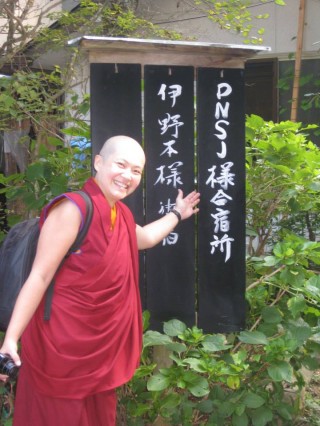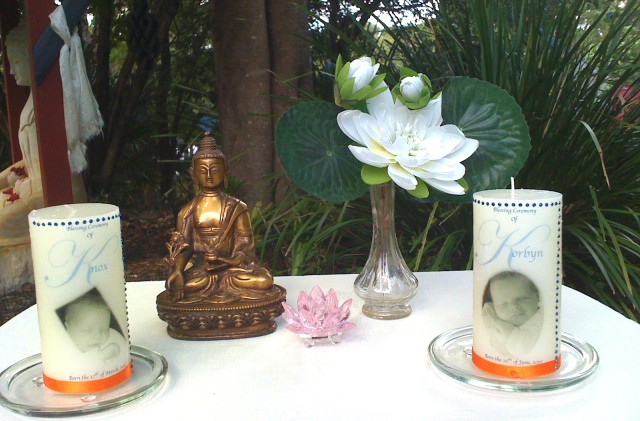- Home
- FPMT Homepage
Foundation for the Preservation of the Mahayana Tradition
The FPMT is an organization devoted to preserving and spreading Mahayana Buddhism worldwide by creating opportunities to listen, reflect, meditate, practice and actualize the unmistaken teachings of the Buddha and based on that experience spreading the Dharma to sentient beings. We provide integrated education through which people’s minds and hearts can be transformed into their highest potential for the benefit of others, inspired by an attitude of universal responsibility and service. We are committed to creating harmonious environments and helping all beings develop their full potential of infinite wisdom and compassion. Our organization is based on the Buddhist tradition of Lama Tsongkhapa of Tibet as taught to us by our founders Lama Thubten Yeshe and Lama Thubten Zopa Rinpoche.
- Willkommen
Die Stiftung zur Erhaltung der Mahayana Tradition (FPMT) ist eine Organisation, die sich weltweit für die Erhaltung und Verbreitung des Mahayana-Buddhismus einsetzt, indem sie Möglichkeiten schafft, den makellosen Lehren des Buddha zuzuhören, über sie zur reflektieren und zu meditieren und auf der Grundlage dieser Erfahrung das Dharma unter den Lebewesen zu verbreiten.
Wir bieten integrierte Schulungswege an, durch denen der Geist und das Herz der Menschen in ihr höchstes Potential verwandelt werden zum Wohl der anderen – inspiriert durch eine Haltung der universellen Verantwortung und dem Wunsch zu dienen. Wir haben uns verpflichtet, harmonische Umgebungen zu schaffen und allen Wesen zu helfen, ihr volles Potenzial unendlicher Weisheit und grenzenlosen Mitgefühls zu verwirklichen.
Unsere Organisation basiert auf der buddhistischen Tradition von Lama Tsongkhapa von Tibet, so wie sie uns von unseren Gründern Lama Thubten Yeshe und Lama Thubten Zopa Rinpoche gelehrt wird.
- Bienvenidos
La Fundación para la preservación de la tradición Mahayana (FPMT) es una organización que se dedica a preservar y difundir el budismo Mahayana en todo el mundo, creando oportunidades para escuchar, reflexionar, meditar, practicar y actualizar las enseñanzas inconfundibles de Buda y en base a esa experiencia difundir el Dharma a los seres.
Proporcionamos una educación integrada a través de la cual las mentes y los corazones de las personas se pueden transformar en su mayor potencial para el beneficio de los demás, inspirados por una actitud de responsabilidad y servicio universales. Estamos comprometidos a crear ambientes armoniosos y ayudar a todos los seres a desarrollar todo su potencial de infinita sabiduría y compasión.
Nuestra organización se basa en la tradición budista de Lama Tsongkhapa del Tíbet como nos lo enseñaron nuestros fundadores Lama Thubten Yeshe y Lama Zopa Rinpoche.
A continuación puede ver una lista de los centros y sus páginas web en su lengua preferida.
- Bienvenue
L’organisation de la FPMT a pour vocation la préservation et la diffusion du bouddhisme du mahayana dans le monde entier. Elle offre l’opportunité d’écouter, de réfléchir, de méditer, de pratiquer et de réaliser les enseignements excellents du Bouddha, pour ensuite transmettre le Dharma à tous les êtres. Nous proposons une formation intégrée grâce à laquelle le cœur et l’esprit de chacun peuvent accomplir leur potentiel le plus élevé pour le bien d’autrui, inspirés par le sens du service et une responsabilité universelle. Nous nous engageons à créer un environnement harmonieux et à aider tous les êtres à épanouir leur potentiel illimité de compassion et de sagesse. Notre organisation s’appuie sur la tradition guéloukpa de Lama Tsongkhapa du Tibet, telle qu’elle a été enseignée par nos fondateurs Lama Thoubtèn Yéshé et Lama Zopa Rinpoché.
Visitez le site de notre Editions Mahayana pour les traductions, conseils et nouvelles du Bureau international en français.
Voici une liste de centres et de leurs sites dans votre langue préférée
- Benvenuto
L’FPMT è un organizzazione il cui scopo è preservare e diffondere il Buddhismo Mahayana nel mondo, creando occasioni di ascolto, riflessione, meditazione e pratica dei perfetti insegnamenti del Buddha, al fine di attualizzare e diffondere il Dharma fra tutti gli esseri senzienti.
Offriamo un’educazione integrata, che può trasformare la mente e i cuori delle persone nel loro massimo potenziale, per il beneficio di tutti gli esseri, ispirati da un’attitudine di responsabilità universale e di servizio.
Il nostro obiettivo è quello di creare contesti armoniosi e aiutare tutti gli esseri a sviluppare in modo completo le proprie potenzialità di infinita saggezza e compassione.
La nostra organizzazione si basa sulla tradizione buddhista di Lama Tsongkhapa del Tibet, così come ci è stata insegnata dai nostri fondatori Lama Thubten Yeshe e Lama Zopa Rinpoche.
Di seguito potete trovare un elenco dei centri e dei loro siti nella lingua da voi prescelta.
- 欢迎 / 歡迎
简体中文
“护持大乘法脉基金会”( 英文简称:FPMT。全名:Foundation for the Preservation of the Mahayana Tradition) 是一个致力于护持和弘扬大乘佛法的国际佛教组织。我们提供听闻,思维,禅修,修行和实证佛陀无误教法的机会,以便让一切众生都能够享受佛法的指引和滋润。
我们全力创造和谐融洽的环境, 为人们提供解行并重的完整佛法教育,以便启发内在的环宇悲心及责任心,并开发内心所蕴藏的巨大潜能 — 无限的智慧与悲心 — 以便利益和服务一切有情。
FPMT的创办人是图腾耶喜喇嘛和喇嘛梭巴仁波切。我们所修习的是由两位上师所教导的,西藏喀巴大师的佛法传承。
繁體中文
護持大乘法脈基金會”( 英文簡稱:FPMT。全名:Found
ation for the Preservation of the Mahayana Tradition ) 是一個致力於護持和弘揚大乘佛法的國際佛教組織。我們提供聽聞, 思維,禪修,修行和實證佛陀無誤教法的機會,以便讓一切眾生都能 夠享受佛法的指引和滋潤。 我們全力創造和諧融洽的環境,
為人們提供解行並重的完整佛法教育,以便啟發內在的環宇悲心及責 任心,並開發內心所蘊藏的巨大潛能 — 無限的智慧與悲心 – – 以便利益和服務一切有情。 FPMT的創辦人是圖騰耶喜喇嘛和喇嘛梭巴仁波切。
我們所修習的是由兩位上師所教導的,西藏喀巴大師的佛法傳承。 察看道场信息:
- FPMT Homepage
- News/Media
-
- Study & Practice
-
-
- About FPMT Education Services
- Latest News
- Programs
- New to Buddhism?
- Buddhist Mind Science: Activating Your Potential
- Heart Advice for Death and Dying
- Discovering Buddhism
- Living in the Path
- Exploring Buddhism
- FPMT Basic Program
- FPMT Masters Program
- FPMT In-Depth Meditation Training
- Maitripa College
- Lotsawa Rinchen Zangpo Translator Program
- Universal Education for Compassion & Wisdom
- Online Learning Center
-
- Prayers & Practice Materials
- Overview of Prayers & Practices
- Full Catalogue of Prayers & Practice Materials
- Explore Popular Topics
- Benefiting Animals
- Chenrezig Resources
- Death & Dying Resources
- Lama Chopa (Guru Puja)
- Lama Zopa Rinpoche: Compendium of Precious Instructions
- Lama Zopa Rinpoche: Life Practice Advice
- Lama Zopa Rinpoche Practice Series
- Lamrim Resources
- Mantras
- Prayer Book Updates
- Purification Practices
- Sutras
- Thought Transformation (Lojong)
- Audio Materials
- Dharma Dates - Tibetan Calendar
- Translation Services
- Publishing Services
- Ways to Offer Support
- Prayers & Practice Materials
-
- Teachings and Advice
- Find Teachings and Advice
- Lama Zopa Rinpoche Advice Page
- Lama Zopa Rinpoche: Compendium of Precious Instructions
- Lama Zopa Rinpoche Video Teachings
- ༧སྐྱབས་རྗེ་བཟོད་པ་རིན་པོ་ཆེ་མཆོག་ནས་སྩལ་བའི་བཀའ་སློབ་བརྙན་འཕྲིན།
- Podcasts
- Lama Yeshe Wisdom Archive
- Buddhism FAQ
- Dharma for Young People
- Resources on Holy Objects
- Teachings and Advice
-
-
*If a menu item has a submenu clicking once will expand the menu clicking twice will open the page.
-
-
- Centers
-
- Teachers
-
- Projects
-
-
-
-
*If a menu item has a submenu clicking once will expand the menu clicking twice will open the page.
-
-
- FPMT
-
-
-
-
-
Your up and down emotions are like clouds in the sky; beyond them, the real, basic human nature is clear and pure.
Lama Thubten Yeshe
-
-
-
- Shop
-
-
-
The Foundation Store is FPMT’s online shop and features a vast selection of Buddhist study and practice materials written or recommended by our lineage gurus. These items include homestudy programs, prayers and practices in PDF or eBook format, materials for children, and other resources to support practitioners.
Items displayed in the shop are made available for Dharma practice and educational purposes, and never for the purpose of profiting from their sale. Please read FPMT Foundation Store Policy Regarding Dharma Items for more information.
-
-
FPMT News Around the World
12
Maitreya Project Kushinagar Takes Important Step Forward
The laying of the foundation stone for a very large Maitreya Buddha statue in Kushinagar, Uttar Pradesh, India, will take place during a ceremony on Friday, December 13, 2013. The ceremony and foundation stone laying will signify the handing over of approximately 275 acres of land from the state government of Uttar Pradesh to the Maitreya Project. The Honorable Shri Akhilesh Yadev, Chief Minister of Uttar Pradesh State, will preside over a the ceremony. FPMT Spiritual Director Lama Zopa Rinpoche and the Board of Trustees of the Maitreya Project Trust will be state guests of honor. Also in attendance will be state ministers and senior government officials. A crowd of 100,000 people is expected for the event, which will include a cultural program featuring Tibetan dancers.
For more than 12 years, the Maitreya Project has worked with Uttar Pradesh State Government officials to create the conditions for the building of the Maitreya Buddha statue. Kushinagar is where Shakyamuni Buddha passed away and was cremated and is one of the four most holy Buddhist pilgrimage sites. The land for the Maitreya statue is adjacent to the Parinirvana Temple, marking where Buddha passed into parinirvana, and the Rambhar Stupa, where the Buddha was cremated. According to ancient texts, when Maitreya Buddha, who is the future Buddha, appears on earth, it will be near Kushinagar.
The land for the statue was given to the Maitreya Project by the Uttar Pradesh State Government, which realized the great potential and public benefit the Maitreya Project offers to the area. The Uttar Pradesh State Government and the Maitreya Project have created a comprehensive development plan for the site and the area surrounding it. In addition to the creation of the Maitreya Buddha statue, the project will also engage in social programs to provide employment, education and healthcare.
The Maitreya Project in Kushinagar will proceed in parallel with the Maitreya Project in Bodhgaya, where another very large statue of Maitreya Buddha is being planned in accordance with FPMT founder Lama Yeshe’s original wish.
Indian media are covering the story, including News 18
, the Business Standard and the New Indian Express.
For more detailed information, see the December 2013 Announcement from the Maitreya Project Kushinagar.
Read Mandala‘s coverage of the Maitreya Project as it has developed over the past three decades.
Mandala brings you news of Lama Zopa Rinpoche and of activities, teachings and events from over 160 FPMT centers, projects and services around the globe. If you like what you read on Mandala, consider becoming a Friend of FPMT, which supports our work.
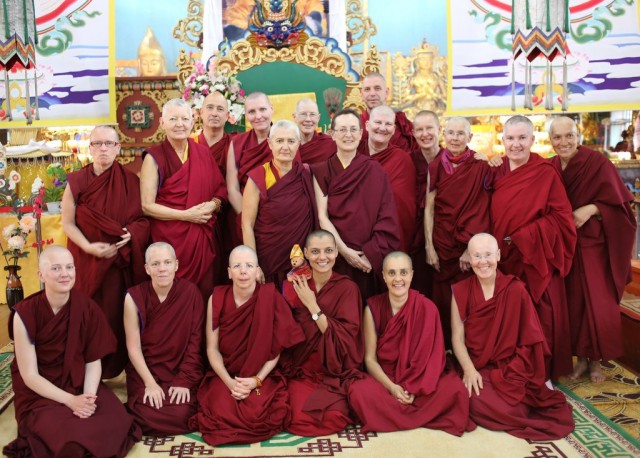
Western Sangha at 100 Million Mani Retreat in Mongolia, August 2013. Photo by Ven. Roger Kunsang.
The new issue of Mandala features a first-hand report from the historic 100 Million Mani Retreat in Mongolia held in August 2013 in Ulaanbaatar. Lama Zopa Rinpoche led the month-long retreat, which was hosted by FPMT Mongolia. As part of Mandala’s online edition, we’ve collected photos from the retreat into a photo gallery. Hundreds of Mongolians attended the retreat in addition to about 70 FPMT students and Sangha from Europe, Australia, Asia and North America.
Mandala brings you news of Lama Zopa Rinpoche and of activities, teachings and events from over 160 FPMT centers, projects and services around the globe. If you like what you read on Mandala, consider becoming a Friend of FPMT, which supports our work.
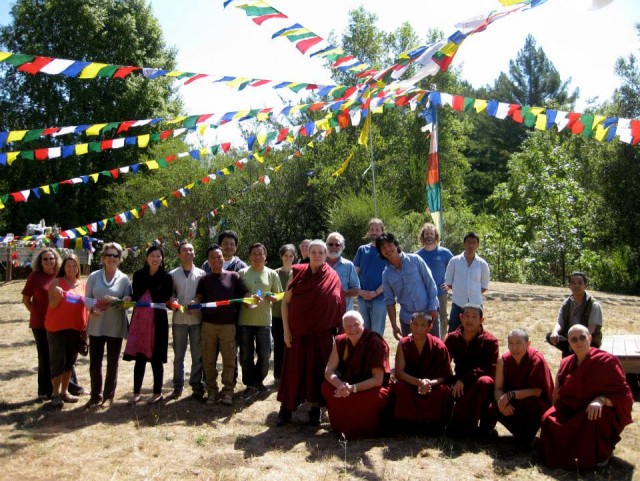
Land of Medicine Buddha community members after hanging new prayer flags, August 21, 2013. Photo courtesy of LMB’s Facebook page.
Special new prayer flags for Lama Zopa Rinpoche’s health and long life are flying and flapping in the breeze throughout the international FPMT mandala. Since July 2013, the Tendil Nyersel prayer flags are being hung based on advice given by Khadro-la (Rangjung Neljorma Khadro Namsel Drönme) on practices to remove obstacles for Rinpoche in 2014 and 2015. The flags feature an emanation of Guru Rinpoche (Padmasambhava) considered to be beneficial for Lama Zopa Rinpoche’s health, various prayers and mantras chosen by Rinpoche, and the supernatural animals of the cardinal directions. Kopan Monastery organized the making of the prayer flags, which was sponsored by a generous benefactor.
The newly released online content for the January-March 2014 issue of Mandala features a collection of photos from various FPMT centers, projects, services and students around the world that have hung flags to support Lama Zopa Rinpoche’s health and long life.
If you’d like to add a photo to the gallery, send Mandala an email.
Mandala brings you news of Lama Zopa Rinpoche and of activities, teachings and events from over 160 FPMT centers, projects and services around the globe. If you like what you read on Mandala, consider becoming a Friend of FPMT, which supports our work.
6
Peace and Harmony
“In his death the world has lost a great leader, whose steadfast and unflinching determination played a key role in securing peace and reconciliation during South Africa’s transition from apartheid rule. Under his leadership South Africa was transformed through peaceful means, in the spirit of reconciliation,” His Holiness the Dalai Lama wrote in a letter to the family of Nelson Mandela, expressing his deep sadness on learning of Mandela’s death.
“He was a man of courage, principle and unquestionable integrity, a great human being, someone of whom we can truly say, ‘He lived a meaningful life,’” said His Holiness, who held Mandela as a dear friend.
“Peace is a state of joy and its method [for accomplishment] is harmony,” Maitripa College president Yangsi Rinpoche said as he reflected on the life of Nelson Mandela during a teaching on the day of Mandela’s passing away. Rinpoche called Mandela a “living example of peace and harmony,” saying it was a great loss and that we need to make prayers for more beings like Mandela to live among us, exemplifying peace and harmony.
Yangsi Rinpoche also referred to His Holiness the Dalai Lama’s call for unity and harmony, made at the end of His Holiness’ visit to Portland in May. He advised that as citizens of the world, we begin creating peace by first creating harmony in ourselves and in our relationships and then in our communities. Being harmonious is a skill, Rinpoche suggested, one of “deescalation” that needs to be practiced with awareness and that becomes grounding and enriches our wisdom and compassion.
The story of the Four Harmonious Friends, which we share with the new online edition of Mandala January-March 2014, illustrates how by working harmoniously together, we can create a peaceful world.
Mandala expresses our sadness at the loss of world leader known for promoting peace, harmony and reconciliation.
Mandala brings you news of Lama Zopa Rinpoche and of activities, teachings and events from over 160 FPMT centers, projects and services around the globe. If you like what you read on Mandala, consider becoming a Friend of FPMT, which supports our work.
- Tagged: four harmonious friends, harmony, maitripa college, mandala, nelson mandela, peace, yangsi rinpoche
- 0
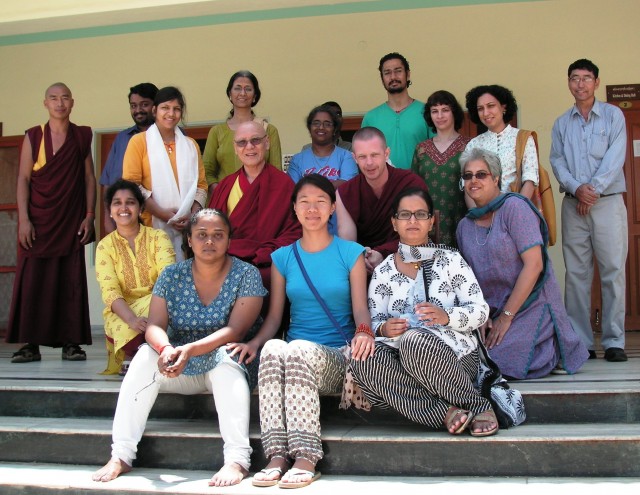
Students from Choe Khor Sum Ling received teachings from Gyume Monastery abbot Geshe Tashi Tsering (center in sunglasses), Hunsur, India, September 2013. Photo by Danyele Gringnon.
By Deepthy Shekhar
Student Deepthy Shekhar shares news from Choe Khor Sum Ling, the FPMT study group in Bangalore, India.
In September, a few Choe Khor Sum Ling students attended a retreat for Discovering Buddhism’s modules 1 and 2 at the glorious Snowland School for Tantric Studies at the Gyume Monastery campus in Hunsur, India. Ven. Tenzin Namdak led the retreat.
The main focus of this retreat was to engage in meditations on “Awakening One’s Enlightenment Potential.” The specific meditations were on the lam-rim topics of precious human rebirth, our innate potential to eliminate negative states of mind, buddhanature and on the topics of compassion and loving kindness.
All the participants were encouraged to take the Eight Mahayana Precepts and engage in Jorchö practices along with both analytical and single-pointed meditations around the topics mentioned above.
Following the tradition of Gyume Monastery, the participants had the precious opportunity of listening to Dharma teachings by the abbot of Gyume Monastery, Geshe Tashi Tsering, who gave two audiences. In the first teaching, Geshe-la spoke about habitual states of mind, inner and outer conditions, the law of cause and effect and purification with the four opponent powers.
In his second teaching, Geshe-la elaborated on the topic “Mind and Its Potential.” He spoke of considering Buddhist centers to be hospitals of the mind and of looking at the study of Buddhism as the study of inner science. During this teaching, he elaborated on topics such as mental factors, how to develop a main mind of loving kindness and developing the main mind for bodhichitta. He also spoke about the importance for meditating on emptiness as the antidote for grasping, anger and related mental factors.
During the retreat, participants were also encouraged to participate in tsog offerings and had discussions with each other in order to develop confidence in talking about their learning.
The students left fully immersed in precious human rebirth and Dharma teachings on mind and its potential, with aspirations for another retreat soon.
Mandala brings you news of Lama Zopa Rinpoche and of activities, teachings and events from over 160 FPMT centers, projects and services around the globe. If you like what you read on Mandala, consider becoming a Friend of FPMT, which supports our work.
- Tagged: choe khor sum ling, mandala
- 0
29
By Garrey Foulkes
In late October, Garrey Foulkes, arts manager of Chenrezig Institute, shared with Mandala an update about the three projects he manages – the Garden of Enlightenment, the Chenrezig Institute Art Studio and the Enlightenment Project for Purification and Merit – and introduces us to Ray Furminger, artist in residence:
For these three projects – the Garden of Enlightenment, the Chenrezig Institute Art Studio and the Enlightenment Project for Purification and Merit, this has been a rather mixed year with an interesting ratio of struggles and successes.
Happily, the positive side of all of this amounts to a very constructive year. Significant repair work, replacing poor-quality casts on the eight stupas in the Garden of Enlightenment and re-painting the decorations, is almost completed thanks to a group of willing and skillful volunteers offering their help despite very hot weather and many large “marsh flies” who enjoy biting people.
The new art studio received a grant to upgrade the parking and landscaping in front of the new building. Our intention is to make this as attractive as possible and encourage visitors to stop, visit the studio, and hopefully find something suitable in our shop to take home with them.
Our resident artist Ray Furminger has now been with us for several year working on a project to complete eight paintings suggested by Rinpoche some years back to be placed on the walls inside the building which houses our large prayer wheel. Needless to say Ray’s skills have been called on to help with many other projects, not the least being a great deal of intricate art work finishing the decorations in the garden in time for His Holiness’ visit some years back.
Since this visit, we have had consistent visits to the center from a large number of school students studying different world religions. These tours happen on roughly a monthly basis and Ray, along with others, give talks on Tibetan iconography and answer basic questions relating to the project.
Ray has been holding regular art workshops at Chenrezig Institute that continue to have good attendance from the local area and Brisbane city. Several students come on a daily basis to paint under his guidance. The energy, good humor and emerging talent among the people working on a daily basis at the art studio gives us great hope for the future.
Ray is a long-time student of Andy Weber, who also comes to the center every year and holds intensive art courses in traditional thangka painting. Assisted by Ray, Andy’s course last September was attended by around 20 people and was seen by all as a great success. It really is quite inspiring to see the changes that these students undergo once they begin to learn the intricacies and symbolism of traditional art and, in many cases, overcome their lack of confidence in their own latent skills and produce some amazing work.
Our big challenge with Ray is to try and find a way keep him here. Ray is British and is currently here on a soon-to-expire extended visa. Australian regulations regarding overseas visitors are now very tight so we need to apply for a special visa that recognizes his great skills as a teacher of traditional spiritual art.
The Enlightenment Project for Purification and Merit, since moving back to Chenrezig Institute, now has its own special space in the new art studio. We are encouraging all of the regional centers to look at what we produce and consider placing stock in their own center shops. Stupas that are required for the Garden of Enlightenment and for other places will also be produced in this workshop. We currently have quite a big commission for Singapore and an ongoing need for more stupas in the gardens.
Updated websites are being worked on so that more people in the region and around the world can see what we have to offer. Several students have ordered molds for tsa-tsa’s relating to their particular practices and commitments. We have a large range to select from.
We are fortunate to have a couple of very skilled three-dimensional artists involved with the project and our intention is to also produce molds for a variety of non-Dharma products like fountains, bird-baths, etc. to display at our sales outlet. Hopefully this will enable us to bring in some extra income that is outside of holy objects and this money can be used in a more general way to keep us functioning by allowing our workers to take a small income.
Chenrezig Institute on Australia’s Sunshine Coast is an active and vibrant Dharma center, offering a robust selection of retreats, workshops and events. Check out their Facebook page for photos and announcements.
- Tagged: chenrezig institute, garrey foulkes, mandala, ray furminger
- 0
26

Geshe Tarchin, resident geshe at Chandrakirti Meditation Centre, on the cover of the Nelson Mail blessing a chicken. Photo courtesy of Enlightenment for the Dear Animals.
From Phil Hunt and Tania Duratovic, project coordinators and founders of Enlightenment for the Dear Animals and coordinators of the Animal Liberation Sanctuary in Nepal:
World Animal Day was celebrated across the globe on October 4, 2013. At Chandrakirti Meditation Centre in New Zealand, Geshe Tharchin and students visited the Nelson SPCA and blessed all the animals (which made the front page of the local paper!), as well as blessing the beings in the ocean. The students pledged to be vegetarian for the day and the center screened 108 Yaks in the evening.
In Bangalore, India, Choe Khor Sum Ling also screened 108 Yaks, visited a local animal shelter and made donations for the animals.
A student in Germany committed to go vegetarian for October with the hope to make it last longer.
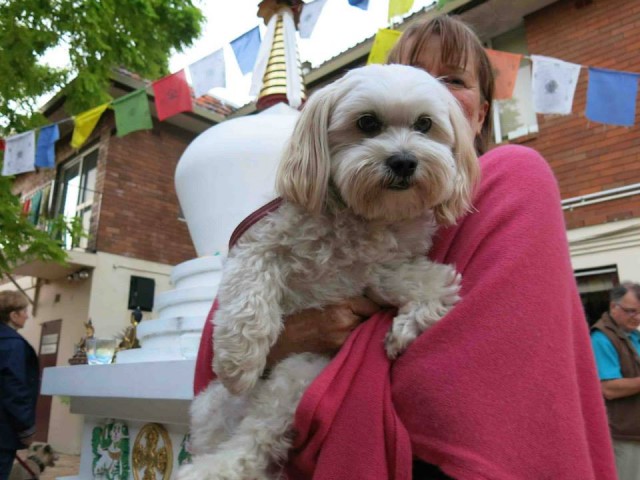
Animals were blessed on World Animal Day at Vajrayana Institute’s stupa, Ashfield, Australia, October 2013. Photo courtesy of Enlightenment for the Dear Animals.
At Vajrayana Institute, Australia, students brought their pets and resident teacher Geshe Samten lead the animal blessing and many circumambulations of the stupa.
Enlightenment for the Dear Animals wants to know how you celebrated World Animal Day, email info@enlightenmentforanimals.org or visit their Facebook page to share.
Mandala brings you news of Lama Zopa Rinpoche and of activities, teachings and events from over 160 FPMT centers, projects and services around the globe. If you like what you read on Mandala, consider becoming a Friend of FPMT, which supports our work.
- Tagged: animals, enlightenment for the dear animals, mandala
- 0
21
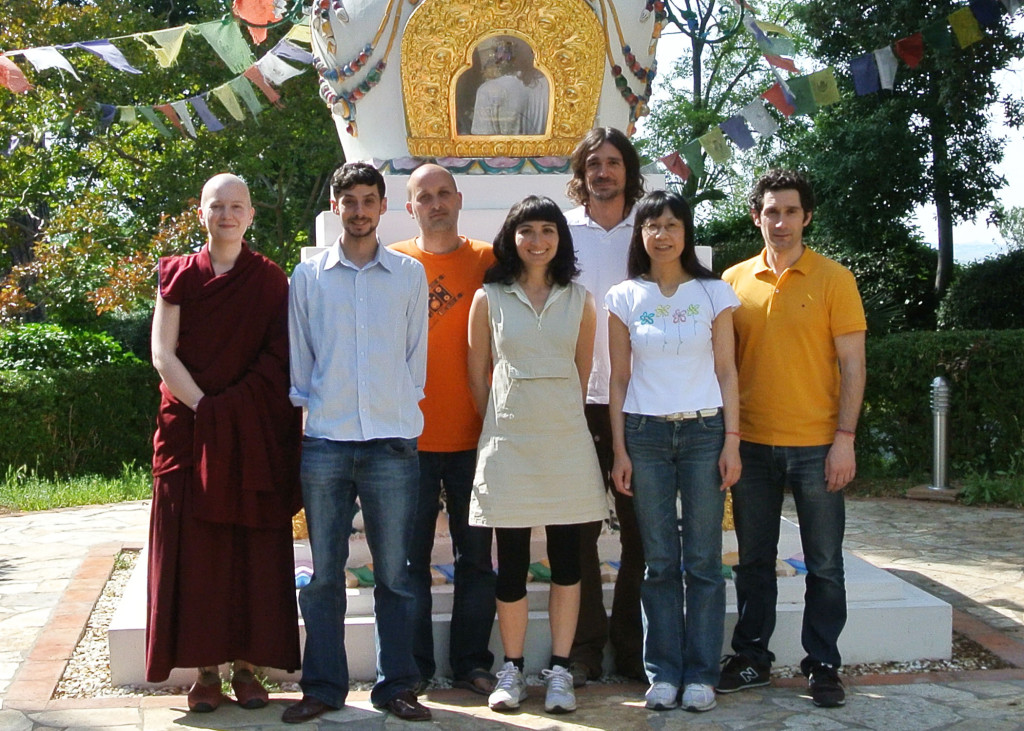
Masters Program students (left to right): Ven. Tiziana Losa, Jacob Fisher, Yaniv Sagi, Marina Brucet, Hans Burghardt, Yumi Terada and Joan Dombón, Istituto Lama Tzong Khapa, Pomaia, Italy, July 2013. Photo courtesy of ILTK.
The 2008-2013 class of the FPMT Masters Program have “just completed their final exams with the intention to enter retreat in 2014,” Olga Planken, Basic Program and Masters Program coordinator for FPMT Education Services, reported to Mandala this week.
Mandala recently featured an interview with five students from the 2008-2013 cohort before their exams had taken place, answering questions about the challenges and benefits of completing the extensive program and what they were looking forward to in the future:
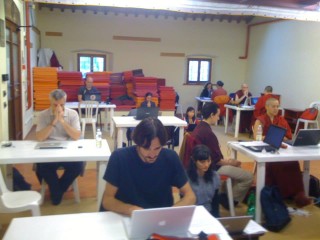
Students from the 2008-2013 FPMT Masters Program cohort sit for their final exams, 2013. Photo courtesy of www.facebook.com/mpretreat.
What do you hope to gain from the culminating one-year retreat?
Marina: I really hope to be able to integrate some of the things we’ve learned during the Masters Program into myself, to gain deeper understanding of the Dharma and of myself, and to set the basis to stabilize and start transforming my mind at a deeper level, a task that I hope will not only be done during the retreat but will continue for the rest of my life. As I see it, it’s the only way to effectively be of benefit to others.
Yumi: I hope to be able to develop some inner qualities that can be really used to help others.
Ven. Tiziana: I feel the need now to have more time to reflect on what I have been studying. Reflection and meditation are essential to gain experience of what we have learned. I am feeling very fortunate to have this rare opportunity.
Jacob: The opportunity to really be in a perfect environment for meditation, and the chance to try and really become this Dharma that we’ve been studying.
Hans: The integration at a deeper level of some of the subjects we’ve studied, and an increased wish to do long retreats.
Masters Program students are now making preparations for their one-year retreat. As part of the preparations, seven of the students have created a fundraising campaign to make it possible for them to be supported during their retreat. So far they have raised €37,800 (US$50,800).
After Masters Program students successfully complete their retreat, they graduate from the program and are then eligible to apply to become FPMT registered teachers. As reported in “The Need for Qualified Teachers” (Mandala April-June 2013), FPMT registered teachers serve as much-needed instructors at FPMT centers around the world, offering authentic Dharma instruction and helping fulfill the wishes of Lama Zopa Rinpoche for education within FPMT. Several resident teachers in FPMT centers today were trained in the FPMT Masters Program’s first cohort, including Don Handrick, Thubten Norbu Ling, US; Sixte Vinçotte, Institut Vajra Yogini, France; Emily Hsu, Gyalwa Gyatso Buddhist Center, US; and Wai Cheong Kok, Vajrayana Institute, Australia.
Masters Program graduates also serve in various other roles to support FPMT education programs, such as teaching assistants, tutors, and coordinators for Masters and Basic Programs, both residential and online, and several teach Discovering Buddhism.
To learn more about the fundraising campaign to finance Masters Program students on their one-year retreats, visit their webpage: Support the rEvolution. You can also connect with the students on their Facebook page.
Mandala brings you news of Lama Zopa Rinpoche and of activities, teachings and events from over 160 FPMT centers, projects and services around the globe. If you like what you read on Mandala, consider becoming a Friend of FPMT, which supports our work.
- Tagged: istituto lama tzong khapa, mandala, masters program
- 0
19
News from Do Ngak Sung Juk in Japan
Do Ngak Sung Juk is the FPMT center in Tokyo, Japan. Center director Doc O’Connor shares news of hosting two esteemed teachers:
Do Ngak Sung Juk in Tokyo had their annual nyung nä with FPMT Taiwan’s Ven. Thubten Dechen September 20-23, 2013. The weekend retreat took place at a traditional Japanese inn on Mt. Mitake. Located in a vast national park, Mitake has a mountain shrine that has existed for almost 2,000 years. The inn has catered to pilgrims for decades.
It was good to read Rinpoche’s comments about serving delicious food in the recent FPMT newsletter. The inn is known for their exquisite meals and even with the nyung nä meal requirements, they were able to maintain their high standard. So not only during the nyung nä did we experience the suffering of beings in the lower realms, but the limited meals gave us a god realm experience, enabling us to generate compassion and make offerings to beings in all realms.
Do Ngak Sung Juk is grateful to Taiwan’s Heruka Center for sharing their invaluable translator with us.
After two years and three postponements, Do Ngak Sung Juk members were happy to have Ven. Tenzin Pemba, co-director of Mahayana Buddhist Association (Cham Tse Ling) in Hong Kong, visit us the weekend of October 19-20, 2013. Ven. Pemba finished teaching the 17-verse The Courageous Hero Gaining Liberation by Overcoming the Fears of the Hazardous Passage of the Intermediate State. At the conclusion of his teachings, we had mixed feelings – happy because we had finished the text, but on the other hand, sad because it is said that an unfinished text creates the cause for the teacher to return.
We hope to purify obstacles and create the karma for more frequent visits by Ven. Pemba to Tokyo. Much, much gratitude to Hong Kong’s Mahayana Buddhist Association for sharing their wonderful teacher with Do Ngak Sung Juk.
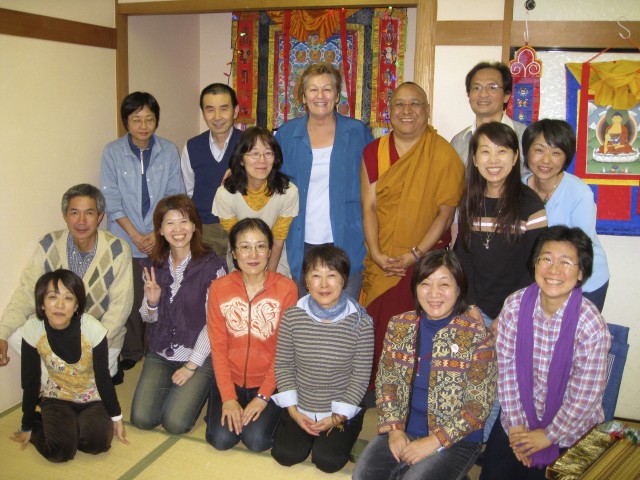
Ven. Pemba with the students of Do Ngak Sung Juk, Tokyo, Japan, October 2013. Photo by Doc O’Connor.
Mandala brings you news of Lama Zopa Rinpoche and of activities, teachings and events from over 160 FPMT centers, projects and services around the globe. If you like what you read on Mandala, consider becoming a Friend of FPMT, which supports our work.
18
Baby Naming at Chenrezig Institute
Ven. Lozang Pema shares how some nuns at Chenrezig Institute in Queensland, Australia, support the Buddhist and non-Buddhist members of their local community:
Although many members of the Chenrezig Nuns Community are engaged in the study program at Chenrezig Institute, we are also engaging with the community on a number of levels, including conducting baby naming ceremonies.
Vens. Lhagsam and Drolkar have conducted the ceremonies over many years with the practice becoming increasingly popular. The simple ceremonies take place at Chenrezig Institute under the Bodhi tree, near one of our stupas or at the Garden of Enlightenment.
“My role in the ceremony is to set the tone, be the visible sign of a spiritual path and bring that element to the event,” Ven. Drolkar said. “I tailor the ceremony to suit the family’s wishes and, as much as I can, make the occasion special and personal for them, something they remember fondly.
“We have an outline, but it is very flexible. We welcome the guests and the baby, read poems that reflect Buddhist or secular values; there is also an opportunity for the baby’s parents or grandparents and family members to speak. We light candles which they can take home as a keepsake. I say a short prayer and sometimes chant mantra. We can plan for it to be non-denominational or very Buddhist.
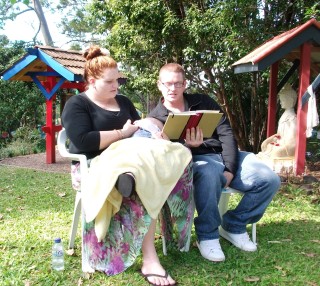
Rebecca and Kurt Rogers doing a reading at their son Knox’s naming ceremony. Photo by Christine Foxwell.
“People from all walks of life, and often from interstate, attend the ceremony. My guess is about 30% of the parents would identify as Buddhist and 30% have values that align with Buddhist values or philosophy; the rest want a non-denominational ceremony.
“I’m not a civil celebrant. His Holiness the Dalai Lama encourages Buddhists (and others) to value other religions, so I aim to make the ceremony inclusive. We have had great feedback about our ability to be flexible.
“It’s a privilege to be a part of an occasion parents consider very special, an occasion that marks the beginning of their child’s spiritual life. It’s also wonderful that people who probably wouldn’t ever come to a Buddhist center have come to Chenrezig Institute.”
Chenrezig Institute offers to its community a venue and support for other important occasions, including commitment ceremonies between partners and memorial/dedication ceremonies.
Mandala brings you news of Lama Zopa Rinpoche and of activities, teachings and events from over 160 FPMT centers, projects and services around the globe. If you like what you read on Mandala, consider becoming a Friend of FPMT, which supports our work.
12
Maitreya Heart Shrine Relic Tour Breaks Records in Bhutan
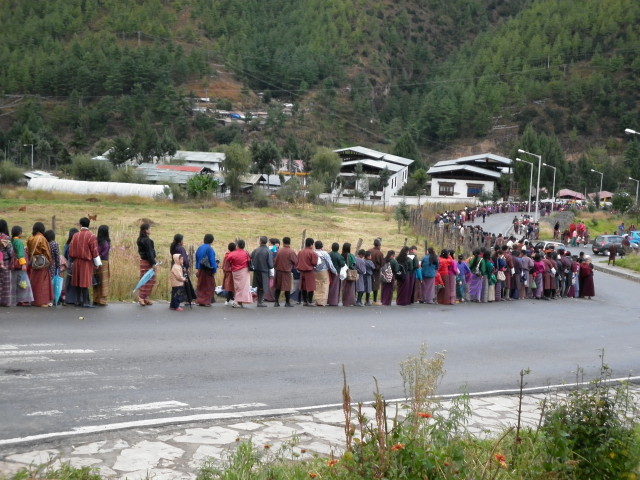
A very long, winding queue at the Thimphu event, Bhutan, October 2013. Photo courtesy of Maitreya Heart Shrine Relic Tour.
The Maitreya Heart Shrine Relic Tour, a collection of sacred relics of the Buddha and other Buddhist masters assembled by Lama Zopa Rinpoche, broke a record for most visitors in Thimphu, Bhutan, the country’s capital. The relics were showcased in RAPA Hall to an estimated 62,000 according to Ugyen Wangdi in an email to Rinpoche.
“A lady in yesterday’s TV interview on Bhutan Broadcast Service,” Ugen adds, “said that the relics came to Bhutan through your auspices.”
Lama Zopa Rinpoche replied:
Thank you very, very much your kind letter and photos and thank you so much supporting the relics. It becomes great purification, way to collect extensive merits for sentient beings, plants the seed of the path to enlightenment that makes it more possible to achieve enlightenment and to free all the sentient beings from the oceans of samsaric sufferings and bring to enlightenment.”
After Bhutan, the Maitreya Heart Shrine Relic Tour continues its European and Asian tour in Sikkim and then with an extended stay in Australia. The concurrent Americas tour is in Miami, Florida, United States until November 17 before moving on to Texas, New Mexico, California and Washington.
Mandala brings you news of Lama Zopa Rinpoche and of activities, teachings and events from over 160 FPMT centers, projects and services around the globe. If you like what you read on Mandala, consider becoming a Friend of FPMT, which supports our work.
- Tagged: bhutan, heart shrine relic tour, lama zopa rinpoche, mandala
- 0
7
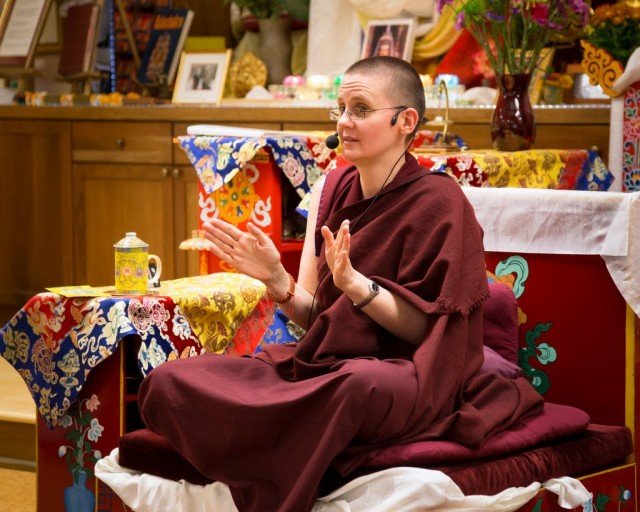
Geshe Kelsang Wangmo at Kadampa Center, Raleigh, North Carolina, US, October 26, 2013. Photo by David Strevel.
Geshe Kelsang Wangmo, who became the world’s first female geshe in April 2011, nears completion of her US teaching tour, which includes several FPMT centers.
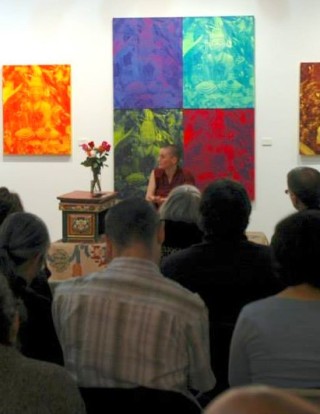
Geshe Kelsang Wangmo speaking in New York, NY, US, October 2013. Photo courtesy of Shantideva Meditation Center’s Facebook page.
On October 16, Shantideva Meditation Center, in New York City, co-sponsored with Tibet House US a talk with Geshe Wangmo on scriptural presentations of the Buddhist understanding of reality.
Geshe Wangmo then traveled to North Carolina to meet the enthusiastic students at Kadampa Center in Raleigh. Over three days in late October, she explained the purpose of debate in Tibetan Buddhism and her journey to become the first female geshe. On October 28, she left students with advice on how to establish their own daily practice, drawing from the materials in FPMT’s Discovering Buddhism courses.
Next, Geshe Wangmo traveled to Northern California for a three-day visit to Land of Medicine Buddha (November 1-3) to talk about the sixteen aspects of the four noble truth. She visited Vajrapani Institute on November 6 and gave a public talk on how her intensive studies transformed her personally.
Geshe Wangmo returns to the East Coast and will meet with Guhyasamaja Buddhist Center students in Virginia on November 8-10. She will give a public talk and weekend retreat on the four noble truths and how they are “relevant to contemporary life and how we can use them to define a balanced, realistic sense of happiness.”
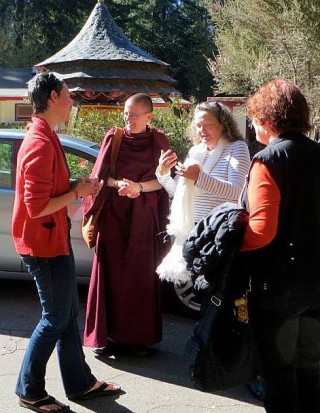
Geshe Kelsang Wangmo with (from left) Vajrapani Institute director Fabienne Pradelle, Land of Medicine Buddha director Denice Macy and Geshe Wangmo’s mother, LMB, California, US, October 2013. Photo courtesy of LMB’s Facebook page.
In co-sponsorship with Jewel Heart Center in New York City, Shantideva Meditation Center welcomes Geshe Wangmo back for the tour’s concluding event, an explanation of the Heart Sutra in relation to emptiness and the two truths.
In Mandala’s exclusive October-December 2012 interview with Geshe Kelsang Wangmo – “The Joy of Study: An Interview with Geshe Kelsang Wangmo” – Geshe Wangmo shares how she became a geshe, the obstacles she overcame, and the benefits of rigorous study.
Mandala brings you news of Lama Zopa Rinpoche and of activities, teachings and events from over 160 FPMT centers, projects and services around the globe. If you like what you read on Mandala, consider becoming a Friend of FPMT, which supports our work.
- Tagged: geshe kelsang wangmo, mandala
- 0
- Home
- News/Media
- Study & Practice
- About FPMT Education Services
- Latest News
- Programs
- New to Buddhism?
- Buddhist Mind Science: Activating Your Potential
- Heart Advice for Death and Dying
- Discovering Buddhism
- Living in the Path
- Exploring Buddhism
- FPMT Basic Program
- FPMT Masters Program
- FPMT In-Depth Meditation Training
- Maitripa College
- Lotsawa Rinchen Zangpo Translator Program
- Universal Education for Compassion & Wisdom
- Online Learning Center
- Prayers & Practice Materials
- Overview of Prayers & Practices
- Full Catalogue of Prayers & Practice Materials
- Explore Popular Topics
- Benefiting Animals
- Chenrezig Resources
- Death & Dying Resources
- Lama Chopa (Guru Puja)
- Lama Zopa Rinpoche: Compendium of Precious Instructions
- Lama Zopa Rinpoche: Life Practice Advice
- Lama Zopa Rinpoche Practice Series
- Lamrim Resources
- Mantras
- Prayer Book Updates
- Purification Practices
- Sutras
- Thought Transformation (Lojong)
- Audio Materials
- Dharma Dates – Tibetan Calendar
- Translation Services
- Publishing Services
- Teachings and Advice
- Find Teachings and Advice
- Lama Zopa Rinpoche Advice Page
- Lama Zopa Rinpoche: Compendium of Precious Instructions
- Lama Zopa Rinpoche Video Teachings
- ༧སྐྱབས་རྗེ་བཟོད་པ་རིན་པོ་ཆེ་མཆོག་ནས་སྩལ་བའི་བཀའ་སློབ་བརྙན་འཕྲིན།
- Podcasts
- Lama Yeshe Wisdom Archive
- Buddhism FAQ
- Dharma for Young People
- Resources on Holy Objects
- Ways to Offer Support
- Centers
- Affiliates Area
- Teachers
- Projects
- Charitable Projects
- Make a Donation
- Applying for Grants
- News about Projects
- Other Projects within FPMT
- Support International Office
- Projects Photo Galleries
- Give Where Most Needed
- FPMT
- Shop
Subscribe to FPMT News
Translate*
*powered by Google TranslateTranslation of pages on fpmt.org is performed by Google Translate, a third party service which FPMT has no control over. The service provides automated computer translations that are only an approximation of the websites' original content. The translations should not be considered exact and only used as a rough guide.If you have compassion in your everyday life, you collect the most extensive merit and purify much negative karma in a very short time. Many lifetimes, many eons of negative karma get purified. That helps you realize emptiness.







